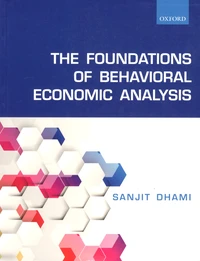Two leaders in the field explore the foundations of bounded rationality and its effects on choices by individuals, firms, and the government. Bounded rationality recognizes that human behavior departs from the perfect rationality assumed by neoclassical economics. In this book, Sanjit Dhami and Cass R. Sunstein explore the foundations of bounded rationality and consider the implications of this approach for public policy and law, in particular for questions about choice, welfare, and freedom.
The authors, both recognized as experts in the field, cover a wide range of empirical findings and assess theoretical work that attempts to explain those findings. Their presentation is comprehensive, coherent, and lucid, with even the most technical material explained accessibly. They not only offer observations and commentary on the existing literature but also explore new insights, ideas, and connections. After examining the traditional neoclassical framework, which they refer to as the Bayesian rationality approach (BRA), and its empirical issues, Dhami and Sunstein offer a detailed account of bounded rationality and how it can be incorporated into the social and behavioral sciences.
They also discuss a set of models of heuristics-based choice and the philosophical foundations of behavioral economics. Finally, they examine libertarian paternalism and its strategies of "nudges."
Two leaders in the field explore the foundations of bounded rationality and its effects on choices by individuals, firms, and the government. Bounded rationality recognizes that human behavior departs from the perfect rationality assumed by neoclassical economics. In this book, Sanjit Dhami and Cass R. Sunstein explore the foundations of bounded rationality and consider the implications of this approach for public policy and law, in particular for questions about choice, welfare, and freedom.
The authors, both recognized as experts in the field, cover a wide range of empirical findings and assess theoretical work that attempts to explain those findings. Their presentation is comprehensive, coherent, and lucid, with even the most technical material explained accessibly. They not only offer observations and commentary on the existing literature but also explore new insights, ideas, and connections. After examining the traditional neoclassical framework, which they refer to as the Bayesian rationality approach (BRA), and its empirical issues, Dhami and Sunstein offer a detailed account of bounded rationality and how it can be incorporated into the social and behavioral sciences.
They also discuss a set of models of heuristics-based choice and the philosophical foundations of behavioral economics. Finally, they examine libertarian paternalism and its strategies of "nudges."

 , qui est-ce ?
, qui est-ce ?